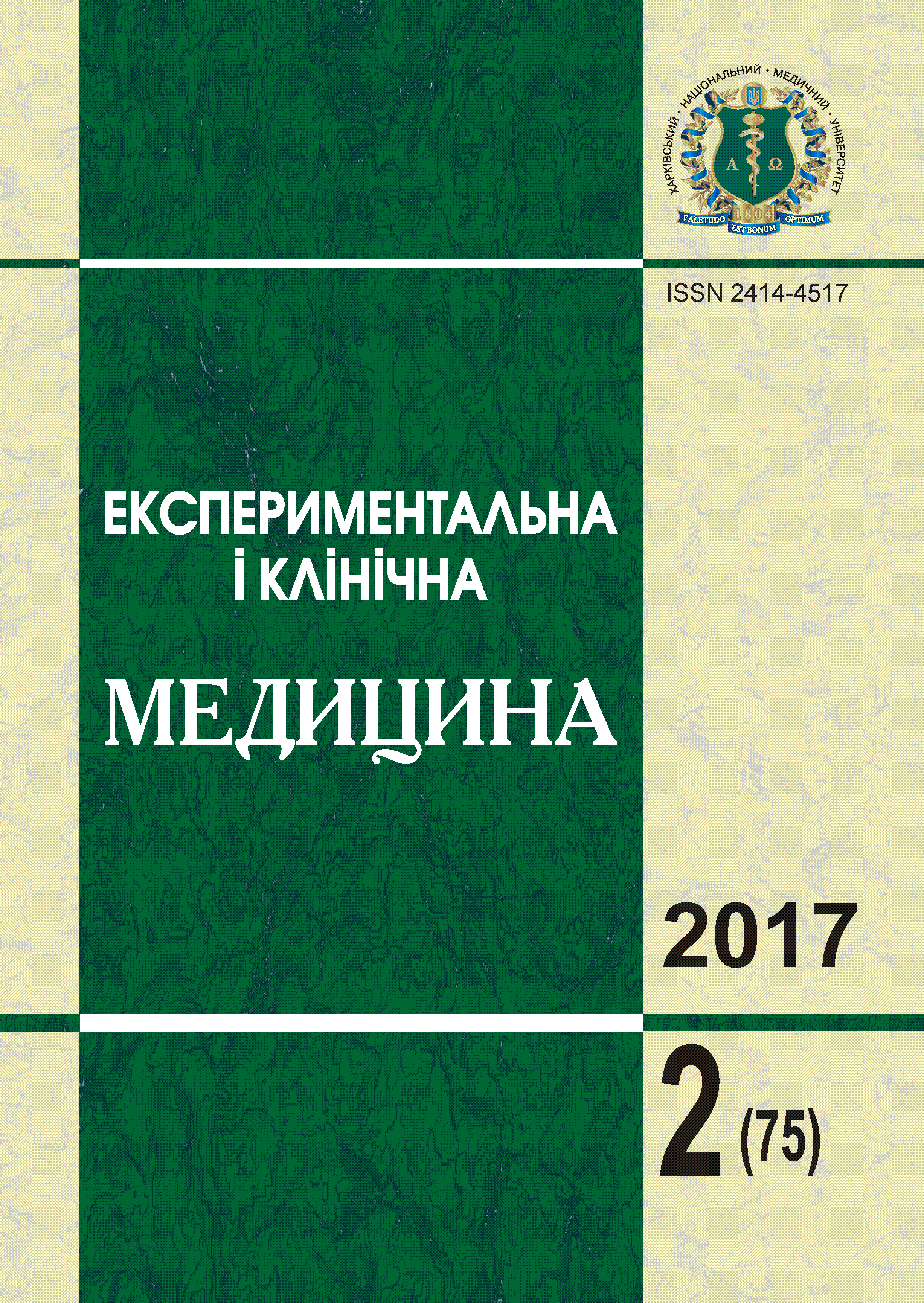Анотація
Розглянуто особливості патогенетичних механізмів поєднаного перебігу артеріальної гіпертензії та цукрового діабету 2-го типу. Дана патологія потенціює розвиток мікро- та макросудинних ускладнень, що підвищує кардіоваскулярний ризик. Супутнє абдомінальне ожиріння сприяє дисбалансу адипоцитокінів, ускладнює перебіг цукрового діабету 2-го типу і погіршує показники вуглеводного обміну. Розвиток інсулінорезистентності характеризується полігенною природою, обумовленою поліморфізмом генів. Зроблено висновок, що комплексний підхід до вивчення генетичних предикторів у формуванні поєднаних артеріальної гіпертензії і цукрового діабету 2-го типу та безпосередньо інсулінорезистентності може сприяти підбору більш точної терапевтичної тактики у пацієнтів з артеріальною гіпертензією і цукровим діабетом 2-го типу.Посилання
Sang H.C., Ji W.B., Eun S.K. Gender diferences in hypertension control among older korean adults: korean social life, health, and aging project // J. Prev. Med. Public. Health. 2015. Vol. 48. P.20.
Zhang H., Mo X., Hao Y. Association between polymorphisms in the adiponectin gene and cardiovascular disease: a meta-analysis // BMC Medical Genetics. 2012. Vol. 13. P.40.
Horr S., Nissen S. Managing hypertension in type 2 diabetes mellitus // Best Pract Res. Clin. Endocrinol. Metab. 2016. Jun. Vol. 30 (3). P.445–454.
Nasser M.R. Association of adiponectin gene polymorphism (þT45G) with acute coronary syndrome and circulating adiponectin levels // Angiology. 2012. Vol. 64 (4). P. 257–265.
Leroith D. Pathophysiology of the metabolic syndrome: implications for the cardiometabolic risks associated with type 2 diabetes // Am. J. Med. Sci. 2012. Jan. – Vol. 3 (1). P. 13–16.
Wu J., Liu Z., Meng K., Zhang L. Association of adiponectin gene (ADIPOQ) rs2241766 polymorphism with obesity in adults: a meta-analysis // PLoS One. 2014. 16 April.
Nibouche W.N., Biad A. Arterial hypertension at the time of diagnosis of type 2 diabetes in adults // Ann. Cardiol. Angeiol, Paris. 2016. Jun. Vol. 65 (3). P. 152–158.
Hanis C.L., Redline S., Cade B.E. Beyond type 2 diabetes, obesity and hypertension: an axis including sleep apnea, left ventricular hypertrophy, endothelial dysfunction, and aortic stiffness among Mexican Americans in Starr County, Texas // Cardiovasc. Diabetol. 2016. Jun. Vol. 8 (15). P. 86.
Khalyfa A., Mutskov V., Carreras A. et al. Sleep fragmentation during late gestation induces metabolic perturbations and epigenetic changes in adiponectin gene expression in male adult offspring mice // Diabetes. 2014. Vol. 63 (3230). P.41.
Gerstein H.C., Pogue J. The relationship between dysglycaemia and cardiovascular and renal risk in diabetic and non-diabetic participants in the HOPE study: a prospective epidemiological analysis // Diabetologia. 2005. Vol. 48 (9). P. 1749–1755.
Медико-демографічна ситуація та основні показники медичної допомоги населенню в регіональному аспекті: 2012 рік / МОЗ України, ДУ «Український інститут стратегічних досліджень МОЗ України». К. 2013. C. 190.
De Cosmo S., Viazzi F., Piscitelli P. AMD-Annals Study Group Blood pressure status and the incidence of diabetic kidney disease in patients with hypertension and type 2 diabetes // J. Hypertens. 2016; Jul. P. 21.
Королюк О.Я., Радченко О.М. Прогностичне значення критеріїв метаболічного синдрому у хворих на ІХС із вперше виявленою гіперглікемією // Практикуючий лікар. 2013. № 4. С. 46–50.
Цукровий діабет, предіабет і серцево-судинні захворювання : Методичні рекомендації Робочої групи Асоціації кардіологів України та Асоціації ендокринологів України з метаболічного синдрому, діабету, предіабету і серцево-судинних захворювань. К.: Асоціація кардіологів України, 2014. C. 40.
Cai R., Yuan Y., J. Sun et al. Statins worsen glycemic control of T2DM in target LDL-c level and LDL-c reduction dependent manners: a meta-analysis // Expert Opin, Pharmacother. 2016; Aug. P. 4.
Razavian N., Blecker S., Schmidt A.M. Prediction of type 2 diabetes from claims data and analysis of risk factors // Big Data. 2015. Vol. 3 (4). P. 277–287.
Chung H-F., Long K.Z., Hsu C-C. Adiponectin gene (AdipoQ) polymorphisms correlate with the progression of nephropathy in Taiwanese male patients with type 2 diabetes // Diabetes research and clinical practice. 2014. Vol. 105 (2). P. 261–270.
Gui M-H., Li X., Jiang S-F. Association of the adiponectin gene rs1501299 G>T variant, serum adiponectin levels, and the risk of coronary artery disease in a Chinese population // Diabetes research and clinical practice. 2012. Vol. 97 (3). P. 499–504.
Cha S.A., Yun J.S., Lim T.S. Hypoglycemia and cardiovascular or all-cause mortality in patients with type 2 diabete // Diabetes Metab. J. 2016. Jun. Vol. 40 (3). P. 202–210.
Yaghootkar H., Lotta L.A., Tyrrell J. Genetic evidence for a link between favorable adiposity and lower risk of type 2 diabetes, hypertension, and heart disease // Diabetes. 2016; Aug. Vol. 65 (8). P. 2448–2460.
Mohammedi K., Woodward M., Hirakawa Y. Microvascular and macrovascular disease and risk for major peripheral arterial disease in patients with type 2 diabetes // Diabetes Care. 2016; Jul. P. 26–30.
Tureck L.V., Leite N., Souza R.L.R. AdipoQ single nucleotide polymorphism: Association with adiponectin and lipoproteins levels restricted to men // Meta. Gene. 2015. P. 98–104.
Savanelli M.C., Scarano E., Muscogiuri G. Cardiovascular risk in adult hypopituitaric patients with growth hormone deficiency: is there a role for vitamin D? // Endocrine. 2016; Apr. Vol. 52 (1). P. 111–119.
Skau J.K., Nordin A.B., Cheah J.C. A complex behavioural change intervention to reduce the risk o2 diabetes and prediabetes in the pre-conception period in Malaysia: study protocol for a randomised controlled trial // Trials. 2016. Vol. 17 (1). P. 215.
Oliveira C.S.V., Saddi-Rosa P., Crispim F. Association of ADIPOQ variants, total and high molecular weight adiponectin levels with coronary artery disease in diabetic and non-diabetic // Brazilian subjects. Journal of diabetes and its complications. 2012. Vol. 26 (2). P. 94–98.
Yao M., Wu Y., Fang Q. Association of ADIPOQ variants with type 2 diabetes mellitus susceptibility in ethnic Han Chinese from northeast China // J. Diabetes Investig. 2016. Vol. 7 (6). P. 205–210.
